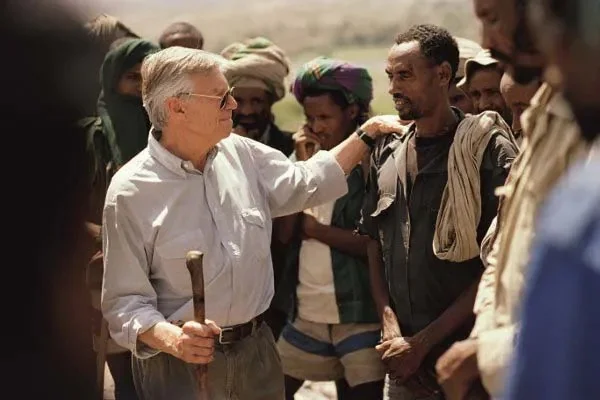Leave traces

Founder of Menschen für Menschen
“What you have done in your life lives on”
What traces do I want to leave behind? Most people probably ask themselves these questions. Nevertheless, many people find it difficult to write a will. It is a reassuring feeling to know that you have taken care of everything for your loved ones.
Menschen für Menschen also strives to ensure that their humanitarian commitment continues into the future. The easiest way to do this is with a legacy. Whether large or small, testamentary donations are very important for Karlheinz Böhm's Aid for Ethiopia. They enable a long-term commitment to the life prospects of particularly poor families.
Why do I need a will?
With a will, you can decide for yourself what should happen to your assets within the framework of the basic rules of inheritance law and specifically consider people who are particularly close to your heart. And you have the opportunity to make a legacy in order to create something good and lasting. Without a will, your estate will be distributed according to legal regulations or, if there are no beneficiaries under inheritance law, will go to the state. A will can be supplemented, changed or canceled at any time by hand or by a notary.
This is how you give the gift of the future
If you would like to include the Foundation Menschen für Menschen in your will, you have the following options:
- Legacy or bequest
This is the simplest way you can support the charity: you specify an amount, a material asset, an object, a property or a percentage of your assets. - Co-heir
You bequeath a share of your assets to the foundation and make the organization a co-heir. Suggested text for your will: “I appoint the Foundation Menschen für Menschen Switzerland as co-heir.” - Sole heir
If you do not have any relatives entitled to inherit, you are free to appoint the foundation as your sole heir.
What is a legacy?
A legacy is a share of property that the testator wishes to give to a person or a non-profit organization. It can consist of a certain amount of money, valuables or real estate. A will can be supplemented, changed or canceled at any time by hand or by a notary.
The new inheritance law
The change in Swiss inheritance law came into force on January 1, 2023. Anyone who has something to pass on is given more creative freedom. So-called compulsory portions for spouses and children are regulated in inheritance law. The compulsory shares are expressed in fractions of the total assets. You can dispose of the rest of your estate yourself through your will: With the so-called “free quota” you make use of your freedom to shape your life according to your will.
With the reform of inheritance law, the “free quota” (see FAQs ) will be strengthened: the compulsory portions for the descendants will shrink to half of their statutory share of the inheritance. So far it has been three quarters.
How do I write a will?
- Create an overview of your assets.
- Take your time to think about who you would like to benefit in your will.
- Determine which people and charitable institutions you would like to inherit and which amounts, valuables and objects you would like to donate. You must pay attention to the compulsory portions. It is advantageous to have a neutral expert advise you on the basic rules.
- Write your will. Your will must be written by hand from beginning to end and must have a heading such as “Will” or “Last Will”. It is important that you include the place and date and your signature on the will.
- It is best to have your will checked by a specialist (notary, lawyer) to ensure that all legal requirements have been observed. In this way, you can prevent disputes when executing your will.
- Leave the will in a safe place, for example with someone you trust, with your notary or with the responsible official body. This is often the municipality of residence. The best thing to do is to contact your local authority.
We support you
With just a few clicks you can find out what your personal situation is like. You can use the simple questionnaire to create your will or your living will online here. You also have the option of receiving free legal advice.
Help instead of suffering
With a bequest to the Foundation Menschen für Menschen, you create a humane future and justice for many young people beyond your own life. “Helping instead of suffering” was the demand of our foundation founder Karlheinz Böhm. With your contribution you help shape this work. Thank you very much!
Do you have any questions about our work in Ethiopia? Would you like information about the settlement of your estate? Then contact us without obligation. We will treat your inquiry confidentially and will be happy to inform you. Would you like a legacy brochure? You can order these from us here.






